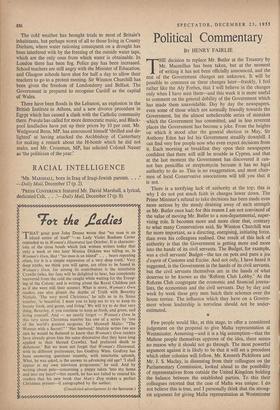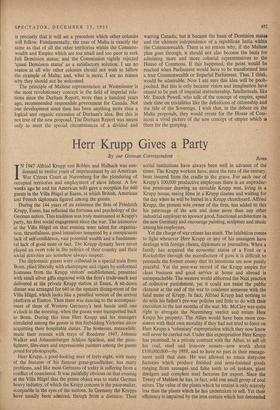Political Commentary
BY HENRY FAIRLIE THE decision to replace Mr. Butler at the Treasury by Mr. Macmillan has been taken, but at the moment of writing it has not been officially announced, and the rest of the Government changes are unknown. It will be possible to comment on these changes later—frankly, I feel rather like the Aly Forbes, that I will believe in the changes only when I have seen them—and this week it is more useful to comment on the general debility of the Government which has made them unavoidable. Day by day the newspapers, even some of those which are normally friendly towards the Government, list the almost unbelievable series of mistakes which the Government has committed, and in less reverent places the Government has become a joke. From the heights on which it stood after the general election in May, Sir Anthony Eden has led his Government steadily downhill. I can find very few people now who even expect decisions from it. Each morning at breakfast they open their newspapers confident that there will still be trouble in Cyprus, and that at the last moment the Government has discovered it can- not ban penicillin or streptomycin because it has no legal authority to do so. This is no exaggeration, and most chair- men of local Conservative associations will tell you that it is not.
There is a terrifying lack of authority at the top; this is why I do not put much faith in changes lower down. The Prime Minister's refusal to take decisions has been made even more serious by the steady draining away of such strength as Mr. Butler once had; for this reason I am not convinced of the value of moving Mr. Butler to a non-departmental, super- vising role. It becomes more and more clear that, contrary to what many Conservatives said, Sir Winston Churchill was far more important, as a directing, energising, initiating force, than even his colleagues realised. One result of this lack of authority is that the Government is getting more and more into the hands of its civil servants. The Budget, for example, was a civil servants' Budget—the tax on pots and pans a jeu d'esprit of Customs and Excise. And not only, I have heard it suggested, is the Government in the hands of its civil servants, but the civil servants themselves are in the hands of what deserves to be known as the 'Reform Club Lobby.' At the Reform Club congregate the economic and financial journa- lists, the economists and the civil servants. Day by day and week by week these grey men hatch their schemes over the house terrine. The influence which they have on a Govern- ment whose leadership is nerveless should not be under- estimated.
Few people would like, at this stage, to offer a considered judgement on the proposal to give Malta representation at Westminster. Assuming—and it is a big assumption—that the Maltese people themselves approve of the idea, there seems no reason why it should not go through. The most powerful argument against it is likely to be that it will set a precedent which other colonies will follow. Mr. Kenneth Pickthorn and Mr. J. S. Maclay, in dissenting from their colleagues on the Parliamentary Commission, looked ahead to the possibility of representatives from outside the United Kingdom holding the balance between the established parties. To this their colleagues retorted that the case of Malta was unique. I do not believe this is true, and I personally think that the strong- est argument for giving Malta representation at Westminster is precisely that it will set a precedent which other colonies will follow. Fundamentally, the case of Malta is exactly the same as that of all the other territories within the Common- wealth and Empire which are too small and too poor to seek full Dominion status; and the Commission rightly rejected `quasi Dominion status' as a satisfactory solution. I see no reason at all why other colonies should not wish to follow the example of Malta; and, what is more, I see no reason why they should not be welcomed.
The principle of Maltese representation at Westminster is the most revolutionary concept in the field of imperial rela- tions since the Durham Report, more than a hundred years ago, recommended responsible government for Canada. Not one development since then has been anything more than a logical and organic extension of Durham's idea. But this is not true of the new proposal., The Durham Report was meant only to meet the special circumstances of a divided and warring Canada; but it became the basis of Dominion status ' and the ultimate independence of a republican India within the Commonwealth. There is no reason why, if the Maltese plan goes through, it should not also become the basis for admitting more and more colonial representatives to the House of Commons. If this happened, the point would be reached when Parliament would have to be transformed into a true Commonwealth or Imperial Parliament. That, I think, would be admirable. Now I am sure this idea will be pooh- poohed. But this is only because vision and imagination have ceased to be part of imperial statesmanship. Intellectuals, like Mr. Enoch Powell, who talk of the concept of empire, spend their time on trivialities like the definitions of citizenship and the title of the Sovereign. I wish that, in the debate on the Malta proposals, they would create for the House of Com- mons a vivid picture of the new concept of empire which is there for the grasping.



































 Previous page
Previous page